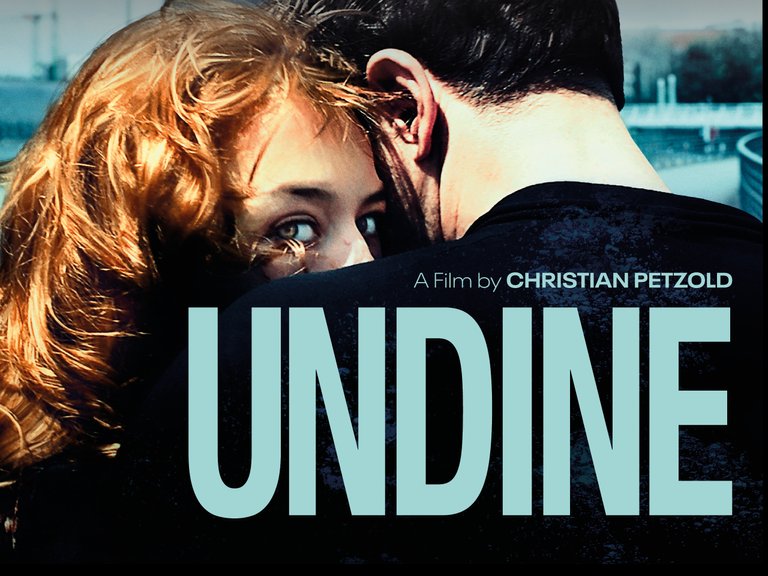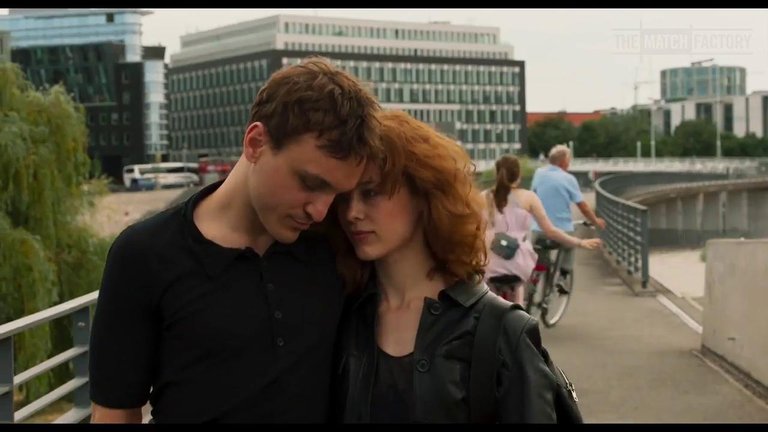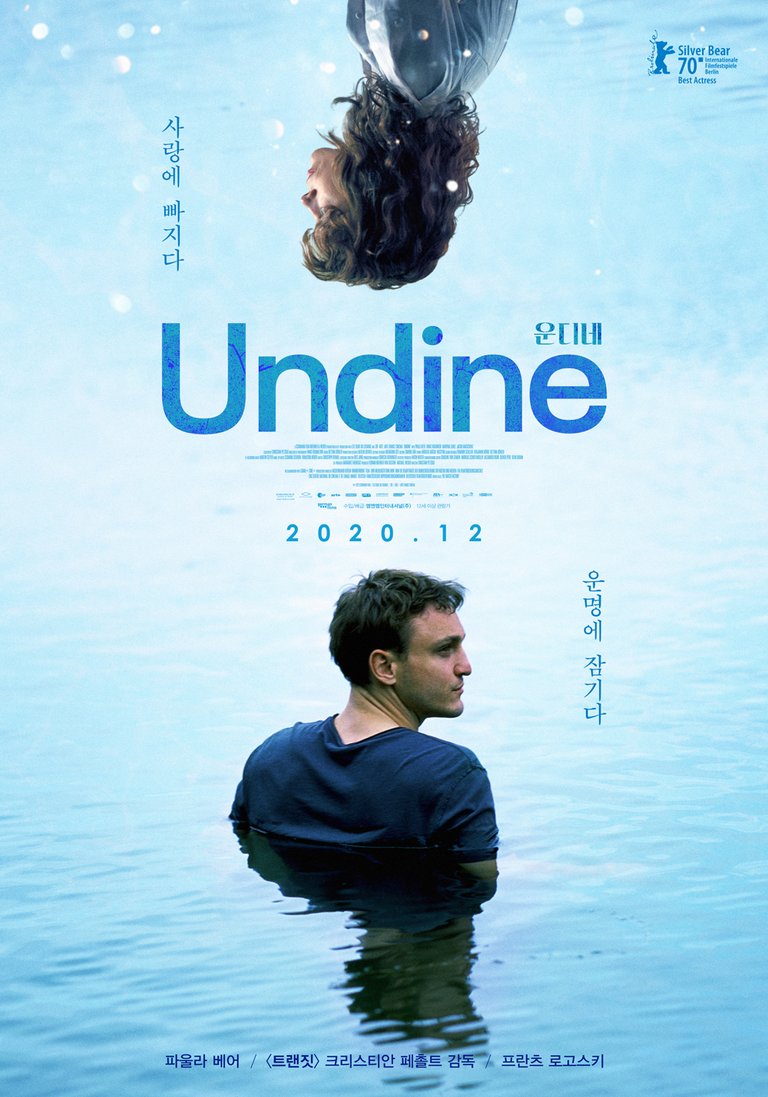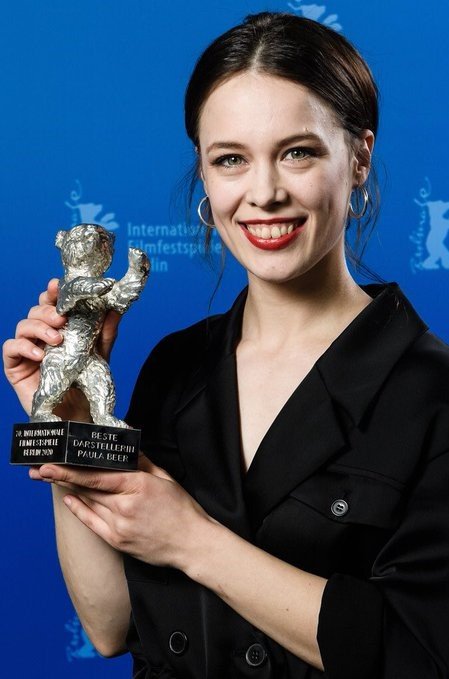Undine (2020): from myth to current life | del mito a la vida actual

Sometimes I go on blind dates with a movie: I don't know anything about the plot or the actors or the director, but there's something in the poster or in a scene that I suddenly see that makes me want to see it. It's not common, but it happens to me. What is more frequent are not so blind dates; That is, films whose plot I don't know, but I watch them because one or two names of the cast or those who make them are familiar to me and have worked on films that I have enjoyed before.
A veces tengo citas a ciegas con una película: no sé nada de la trama ni de los actores ni del director, pero hay algo en el poster o en una escena que veo de repente que me hace querer verla. No es común, pero me pasa. Lo que sí es más frecuente son las citas a no tan ciegas; es decir, películas cuya trama desconozco, pero que las veo porque uno o dos nombres del reparto o de quienes la realizan me resultan familiares y han trabajado en películas que he disfrutado antes.
Such is the case of the Franco-German film Undine starring Paula Beer, whose role in Werk ohne Autor I loved and led me to see her also in Frantz; and directed by Christian Petzold, director and screenwriter of Phoenix and Barbara, both starring Nina Hoss. To this we can add that the co-star of Undine is Franz Rogowski, whom I had not yet seen act but who I know is starring in Passages, a film released this year and highly promoted on MUBI, along with Adèle Exarchopoulos (one of my favorite European actresses), so by deciding to watch Undine I could not only appreciate the collaboration between two names known to me, Beer and Petzold, but also meet someone new for the first time, Rogowski. In a few lines, the plot of the film begins with Undine (Paula Beer), a historian who gives lectures on urbanity in a museum in Berlin, that is, she explains to her visitors - often tourists - the urban and architectural development of the city in the last decades. Next to the museum where she works there's a café where she meets Johannes, a married man with whom she's in a relationship. Until one day, he breaks up with her and Undine tells him, we don't know at the time if it's a joke or if she means it, that if he leaves her she will have to kill him. So she asks him to wait for her while she finishes her talk, but when she leaves the museum to talk to Johannes again, he has already left.
Tal es el caso de la cinta franco-alemana Undine protagonizada por Paula Beer, cuyo papel en Werk ohne Autor me encantó y me llevó a verla también en Frantz; y dirigida por Christian Petzold, director y guionista de Phoenix y Barbara, ambas protagonizadas por Nina Hoss. A ello podemos sumar que el co protagonista de Undine es Franz Rogowski, a quien aún no había visto actuar pero de quien sé que protagoniza Passages, una película estrenada este año y muy promocionada en MUBI, junto a Adèle Exarchopoulos (una de mis actrices europeas favoritas), así que al decidir ver Undine no sólo podría apreciar la colaboración entre dos nombres conocidos por mí, Beer y Petzold, sino también encontrarme por primera vez con alguien nuevo, Rogowski.
En pocas líneas la trama de la película empieza con Undine (Paula Beer), una historiadora que da conferencias de urbanidad en un museo de Berlín, es decir explica a sus visitantes - muchas veces turistas - el desarrollo urbano y arquitectónico de la ciudad en las últimas décadas. A u lado del museo en el que trabaja hay un café en donde ella se cita con Johannes, un hombre casado con quien mantiene una relación. Hasta que un día, él rompe con ella y Undine le dice, no sabemos en ese momento si es una broma o si lo dice en serio, que si la deja ella tendrá que matarlo. Así que le pide que la espere mientras termina su charla, pero cuando ella sale del museo para hablar de nuevo con Johannes, él ya se ha ido.

In the midst of her spite, Undine meets Christoph, one of the attendees at her conference and after a coffee and a conversation, both begin a passionate relationship that seems to be only sexual, but over time also becomes something emotional. So we think that the girl has managed to overcome the breakup with Johannes and that this new relationship is her ticket to happiness. But this is not Netflix.
En medio de su despecho, Undine conoce a Christoph, uno de los asistentes a su conferencia y después de un café y una conversación, ambos inician una relación apasionada que pareciera ser solamente sexual, pero que con el tiempo se convierte también en algo emocional, así que pensamos que la chica ha logrado superar la ruptura con Johannes y que esta nueva relación es su pasaje a la felicidad. Pero esto no es Netflix.
Many aquatic references are presented throughout the entire film: Christoph is an industrial diver; On the first date with Undine, he accidentally breaks an aquarium and we see how the water covers the entire floor of the cafe; A pool appears and there's a pond that will play an important role in the plot and all this is because the title of the film refers to the Undines, aquatic nymphs from Greek mythology who have similar characters in myths from other regions and times, which makes it a little difficult to explain the myth (because there are many versions), but it would be more or less like this: being very young, Undine is taken away from her mother and the fairies by a young man who manages to make her fall in love with him and, as at birth, the girl had been granted great persistence, Undine stays with him no matter what happens at home. As punishment for not having attended after her mother's death, Undine's grandmother condemns her to eternally love the young man, so when he abandons her, her grandmother somehow rescues her and transforms her into a nymph that protects a river. Up to that point it seems like a sad story with a poetic ending, but there are slightly more disturbing versions in which Undine stars in curses and legends, and it is that threatening tone that Petzold has given to the character that seems to be transforming into one of these mythological beings as the film progresses.
A lo largo de toda la película se presentan muchas referencias acuáticas: Christoph es un buzo industrial; en la primera cita con Undine, él rompe accidentalmente un acuario y vemos cómo el agua cubre todo el suelo del café; aparece una piscina y hay un estanque que jugará un papel importante en la trama y todo esto es así porque el título de la película hace referencia a las Ondinas, ninfas acuáticas de la mitología griega que tienen personajes semejantes en mitos de otras regiones y épocas, lo que hace un poco difícil explicar el mito (porque hay muchas versiones), pero que sería más o menos así: siendo muy joven, Ondina es llevada lejos de su madre y de las hadas por un joven que logra enamorarla y como al nacer a la chica le habían otorgado una gran persistencia, Ondina se queda con él sin importar lo que pase en casa. Como castigo por no haber asistido tras la muerte de su madre, su abuela de Ondina la condena a amar eternamente al joven, por lo que cuando este la abandona, de alguna forma su abuela la rescata y la transforma en una ninfa protectora de un río. Hasta allí parece una historia triste con un final poético, pero hay versiones un poco más perturbadoras en las que Ondina protagoniza maldiciones y leyendas, y es ese tono amenazante el que Petzold le ha dado a su personaje que pareciera ir transformándose en uno de estos seres mitológicos a medida que transcurre la película.

Although it has that touch of fantasy, or legend, however you want to see it, Undine is in itself a romantic drama, the story of what a disappointment in love can do to a person and how it can affect those who surround her. Franz Rogowski's performance is very good and I can't wait to see him in Passages alongside Ben Whishaw and Adèle Exarchopoulos. The photography is fantastic and Paula Beer's performance is exceptional (as always when I have seen her on screen), but of the director's works I prefer my two previous visits and without a doubt I will see some other of his films because they sound interesting in their synopses and because there are a couple more out there in which she collaborates with Nina Hoss or Paula Beer, great actresses of German cinema.
I started to think if I had seen any other movie that modernized a Greek myth without doing so in such a direct way (that is, not like Percy Jackson) and I could only remember My Fair Lady with Audrey Hepburn, which although it is based on George Bernard Shaw's play, the original source of the idea is the Greek myth of Pygmalion, a man in love with his own creation. I couldn't remember any others, but I trust the extensive cinematographic knowledge of this community so I ask you, do you remember any movie that has told a current story but taking some mythology as a reference? Which one would you recommend me? I read you in the comments.
Si bien tiene ese toque de fantasía, o de leyenda, como lo quieran ver, Undine es en sí un drama romántico, la historia de lo que una decepción amorosa puede causarle a una persona y cómo puede afectar a quienes la rodean. La actuación de Franz Rogowski es muy buena y no puedo esperar a verlo en Passages junto a Ben Whishaw y Adèle Exarchopoulos. La fotografía es fantástica y la actuación de Paula Beer es excepcional (como siempre que la he visto en pantalla), pero de los trabajos del director prefiero mis dos visitas previas y sin duda que veré alguna otra de sus películas porque suenan interesantes en sus sinopsis y porque hay un par más por allí en las que colabora con Nina Hoss o con Paula Beer, grandes actrices del cine alemán.
Me puse a pensar si había visto alguna otra película que modernizara un mito griego sin hacerlo de forma tan directa (o sea, que no sea como Percy Jackson) y sólo pude recordar My Fair Lady con Audrey Hepburn, que si bien se basa en la obra de teatro de George Bernard Shaw, la fuente original de la idea es el mito griego de Pigmalión, un hombre enamorado de su propia creación. No logré recordar alguna otra, pero confío en el amplio conocimiento cinematográfico de esta comunidad así que les pregunto ¿recuerdan alguna película que haya contado una historia actual pero tomando como referencia alguna mitología? ¿cuál me recomendarían ver? Los leo en los comentarios.
Reviewed by | Reseñado por @cristiancaicedo
Other posts that may interest you | Otros posts que pueden interesarte:
  |
|---|


